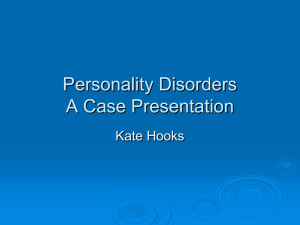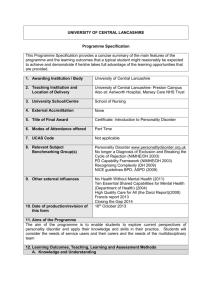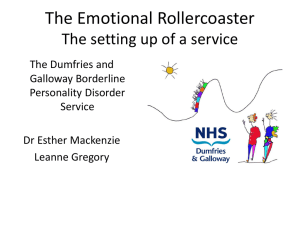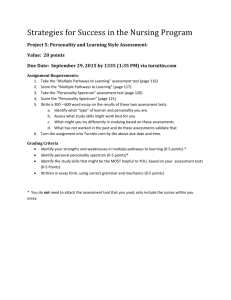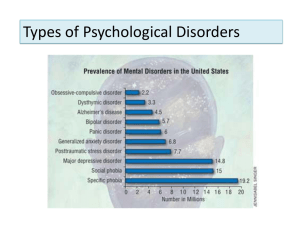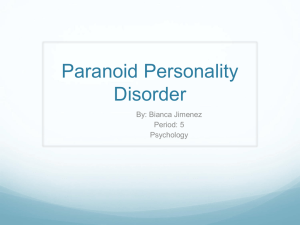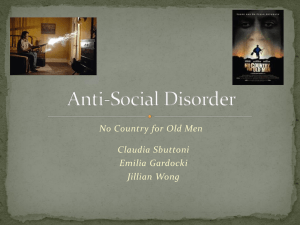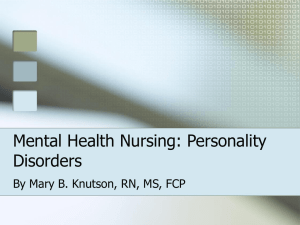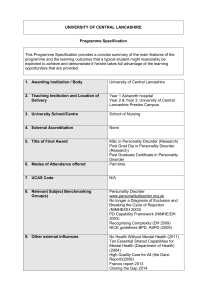PGc Personality Disorder (Sept 2014)
advertisement
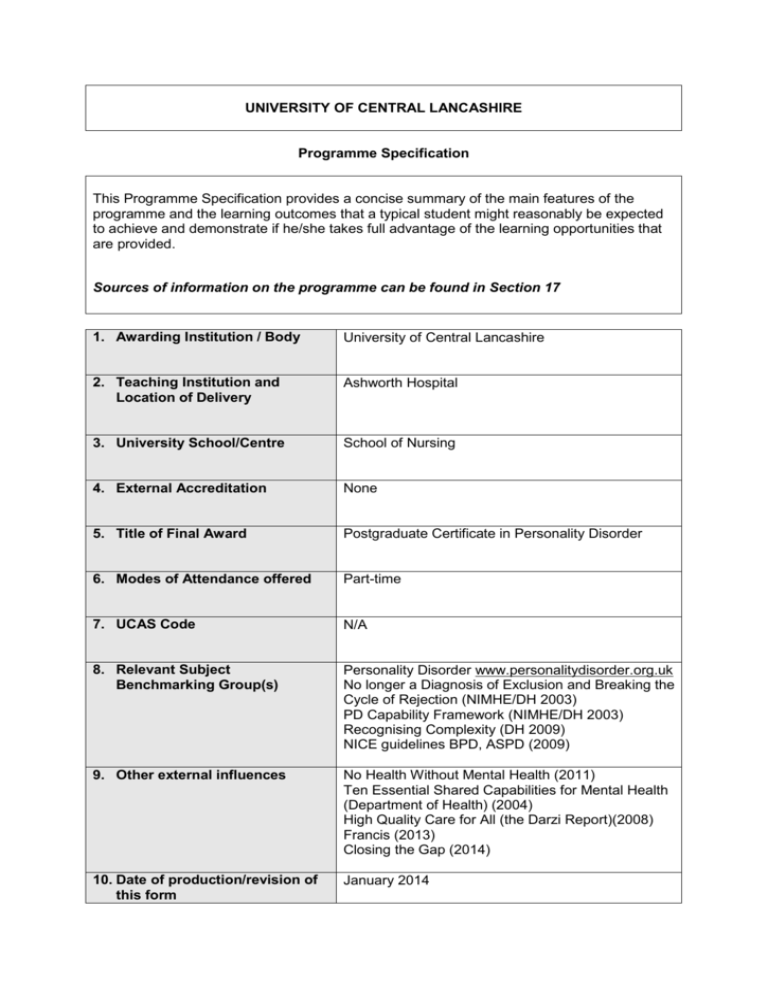
UNIVERSITY OF CENTRAL LANCASHIRE Programme Specification This Programme Specification provides a concise summary of the main features of the programme and the learning outcomes that a typical student might reasonably be expected to achieve and demonstrate if he/she takes full advantage of the learning opportunities that are provided. Sources of information on the programme can be found in Section 17 1. Awarding Institution / Body University of Central Lancashire 2. Teaching Institution and Location of Delivery Ashworth Hospital 3. University School/Centre School of Nursing 4. External Accreditation None 5. Title of Final Award Postgraduate Certificate in Personality Disorder 6. Modes of Attendance offered Part-time 7. UCAS Code N/A 8. Relevant Subject Benchmarking Group(s) Personality Disorder www.personalitydisorder.org.uk No longer a Diagnosis of Exclusion and Breaking the Cycle of Rejection (NIMHE/DH 2003) PD Capability Framework (NIMHE/DH 2003) Recognising Complexity (DH 2009) NICE guidelines BPD, ASPD (2009) 9. Other external influences No Health Without Mental Health (2011) Ten Essential Shared Capabilities for Mental Health (Department of Health) (2004) High Quality Care for All (the Darzi Report)(2008) Francis (2013) Closing the Gap (2014) 10. Date of production/revision of this form January 2014 11. Aims of the Programme The aim of this programme is to provide students with a theoretical understanding of personality disorder and its philosophical and ideological underpinnings. Students will be facilitated to broaden and deepen their approaches to therapeutic assessment and interventions in the context of mental health research and policy. 12. Learning Outcomes, Teaching, Learning and Assessment Methods A. Knowledge and Understanding A1.Analyse research findings behind the study of personality disorder, and utilize these in furthering clinical practice A2.Evaluate current assessment strategies and therapeutic approaches for personality disorder and produce recommendations for practice A3.Evaluate a range of assessment tools available for use with a person with a personality disorder Teaching and Learning Methods Small interactive group discussions facilitated by the lecturer and/ or service user/ practitioner. Students will be required to participate in a formal debate during the course. Case presentations, (case analysis), use of video and electronic resources including E-learn for support. Facilitated wider reading and deeper analysis of subject matter. Assessment methods Essay, report and case study. B. Subject-specific skills B1. Utilise research based evidence to synthesise and implement effective assessment planning B2. Analyse the concept of risk assessment and management strategies to ensure the safety of the service users and staff B3. Explore and evaluate the therapeutic relationship to provide an analysis of the dynamics present within the helping relationship B.4 Appraise the classification systems of personality disorder and their usefulness to practice. Teaching and Learning Methods Student supervision/ tutorial to support individual approaches and needs. Practice and service user representatives assist in the delivery of the modules. Assessment methods Essay, report and case study. C. Thinking Skills C1. Analyse personal effectiveness in promoting social inclusion of people with personality disorder C2. Examine the ideological basis of personality disorder and place this in context of current practice. C3. Critically appraise the concepts surrounding and supporting the principles of therapeutic relationships, peer supervision and support in working with personality disorder. Teaching and Learning Methods Students will participate in formal reflection and self development through structured workshops. Students will participate in facilitated self awareness groups. Students will be required to participate in a formal debate during the course. Assessment methods Essay, report and case study. D. Other skills relevant to employability and personal development D1. Demonstrate innovative practice and critically discuss this concept in the light of role and professional boundaries. D2. Critically review personal attitudes, values, attitudes and beliefs regarding personality disorder in order to establish personal presence and influence whilst maintaining personal integrity. Teaching and Learning Methods Student supervision/ tutorial to support individual approaches and needs Assessment methods Essay, report and case study 13. Programme Structures* Level Level 7 Level 7 Module Code NU4015 Module Title Assessment & Therapeutic Approaches to personality Disorder NU4309 Classification and Theory of Personality Disorder 15. Personal Development Planning 14. Awards and Credits* Credit rating 40 Postgraduate certificate Requires 60 credits at Level 7 20 According to QAA (2004), Personal Development Planning (PDP) is: A structured process that is integral to higher level learning Concerned with learning in an holistic sense (academic and non-academic) Something done with guidance and support A process that involves reflection, creation of personal records, planning and monitoring progress towards achievement of personal objectives Intended to improve the capacity of the individual to communicate their learning to others who are interested in it (academic staff/ employers) This is a multi-agency course that pre-dominantly attracts students from health and social care and criminal justice agencies who bring with them models of support and supervision in their workplace. All students are appraised annually within their employment. In order to enhance individual personal development planning students will be encouraged to develop their learning contract with their chosen mentor identifying areas for development during and after the course. During the course students will be supported in this process through negotiated discussions, tutorials, interactions and assessments. This will help them to explore and record their progress and to set goals and devise action plans to meet their needs thus extending their personal and professional development. 16. Admissions criteria Programme Specifications include minimum entry requirements, including academic qualifications, together with appropriate experience and skills required for entry to study. These criteria may be expressed as a range rather than a specific grade. Amendments to entry requirements may have been made after these documents were published and you should consult the University’s website for the most up to date information. Students will be informed of their personal minimum entry criteria in their offer letter. Informal enquiries are welcomed. Students should have a first degree (2:2 class or above) or equivalent, in a relevant subject (i.e. health related, pure science or social science) from an approved institution of higher education. If you do not meet these criteria you are advised to contact the course leader for advice. Transfer of credits in accordance with University regulations may be possible. Students normally have at least two years post qualifying clinical experience in practice OR proof of equivalent experience in practice Be working in, or able to access a practice environment that will enable them to meet and achieve the course learning outcomes. Have identified a work based mentor, who will support and guide your development throughout the course. Be able to provide two references (one practice/work and one academic). Be able to satisfy the Course Leader that you are competent to pursue the programme. All students will be interviewed. The purpose of this discussion is first to ensure that you understand the nature of the programme and its demands and to pathway plan your modular route leading to the identified award and exit point. Identification of financial support will be noted. Your application will be considered on its merits and in the light of the nature and scope of the programme. If you do not meet the above criteria you may still be considered for admission to the programme; you will be required to provide evidence of suitable experience and supportive qualifications. 17. Key sources of information about the programme Fact sheet University of Central Lancashire website CPD prospectus 18. Curriculum Skills Map Please tick in the relevant boxes where individual Programme Learning Outcomes are being assessed Programme Learning Outcomes Module Level Code Module Title Core (C), Compulsory (COMP) or Knowledge and Subject-specific Option (O) understanding Skills LEVEL 7 LEVEL 7 A1 NU4015 Assessment & Therapeutic Compulsory Approaches for personality Disorder NU4309 Classification and Theory of Personality Disorder Compulsory A2 A3 B1 B2 B3 B4 Thinking Skills C1 C2 Other skills relevant to employability and personal development C3 D1 D2
